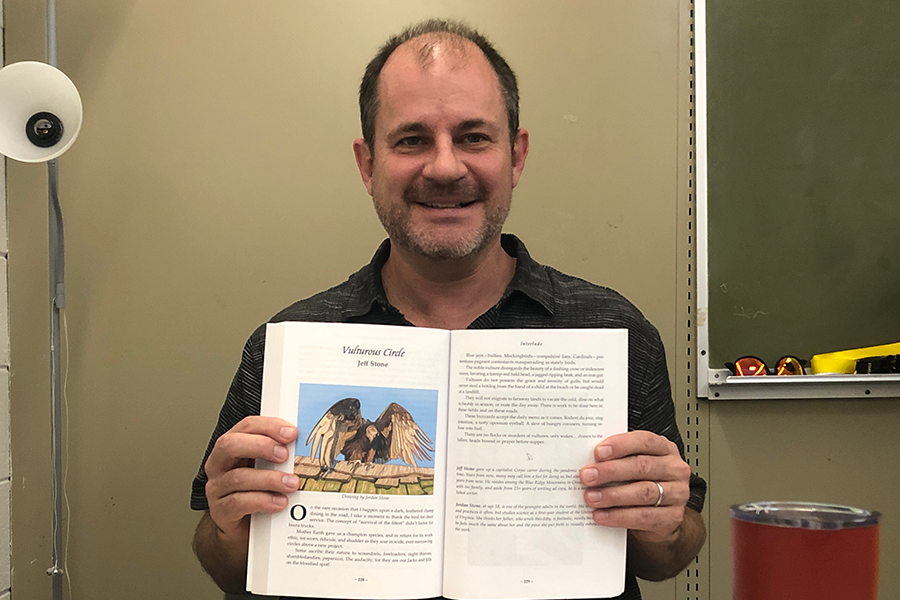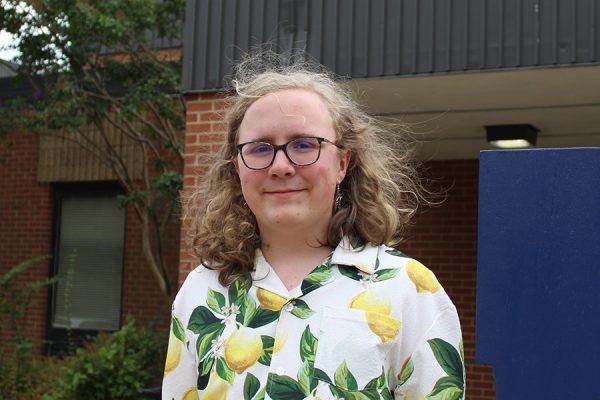Students may be familiar with Jeff Stone from their study halls, but beyond the B Wing, he’s also a dedicated creator. “I don’t know if I would just call myself a writer,” Stone said, but “I do a lot of writing.”
“I’ve always had stories in my head, since I was very young,” Stone said. His teaching job, on the other hand, is relatively new: for more than 25 years, his career was in advertising. He said “that required a lot of creativity, and writing, but it was writing for profit. It was writing for brands. Sometimes, it’s a soul-sucking experience.” In 2020, Stone quit the business world, looking for a job where he could give back to the community. He found that job at WAHS, and in the process, returned to a space that always fascinated him as a storyteller. “The American high school is such a unique place,” Stone said, one that “almost everyone goes through almost the same way. Looking back, it was kind of a magical experience.”
“I think to me, there are probably two types of writers,” Stone said. “Ones that outline and plan way ahead, and ones like me. I have an idea, one I think is maybe big enough to make a story out of, and then I dive right in.”
His writing process involves a lot of editing. He said “I write long, and I sculpt. I do lots of editing, because I write lots of words.” Stone said his lack of a plan can be freeing or even inspiring. “I find that’s when the best stuff comes. It comes out of the ether; ideas or characters that you don’t expect, that come out of nowhere and become as interesting as the story itself.”
Many of Stone’s ideas appear from interesting tidbits he hears in his everyday life. “Joan Didion is one of my favorite writers, and she said something simple that I ascribe to, which is ‘see enough and write it down.’” He’s constantly keeping his ears open for ideas that jump out to him. “I was riding along with my mother-in-law,” Stone said. “I was driving, and in the backseat she said ‘You know, a friend of mine, he’s in his 60’s, and he just got married,’ and I say ‘Oh, that’s nice.’ She says, ‘to a formerly cloistered nun.’ So I say, ‘That’s interesting. What does he do for a living?’ And then my wife inserted and said ‘He’s probably an auctioneer.’ I thought that was silly: an auctioneer who never stops talking, married to a nun who does not speak at all.” The auctioneer and the nun appear in a love story that Stone wrote following that car ride.
He’s found inspiration in other members of his family too: “There are a series of stories that were told about my grandfather’s service in World War II,” he said. These family legends became the kernels of the stories Stone hopes to publish in his first full book: a collection of what he calls “historical family fiction.” The anthology follows a fictionalized version of these Stone ancestors during the war. “Some of the stories weren’t particularly heroic, but just interesting. Or odd, or strange. I wrote about that timeframe, about my grandfather and his brother, what they experienced. They survived, they came back, and they had so much to tell.”
The people Stone has met through his current career inspire his work as well. “The first thing I wrote with a serious interest in getting published was a memoir of my experience going from the business world to the auditorium of our school in front of 75 kids. I was very inspired by what I witnessed” when he began at WAHS. “And while I didn’t write about any particular students or activities or teachers or staff,” he said, “I drew a lot of inspiration, energy, even ideas for characters that might act differently in a different setting, inside of a story.”
For Stone, writing is almost meditative. “When I was younger, in my career years, I was always striving for the next rung of the ladder,” he said, “to make manager, make VP, make the next thing, to strive more, make more. But it’s very nice to let a lot of that go and try to make my life and creative work kind of a simple thing.”
Stone has simple goals for his writing, too. “I do want to improve,” he said. “I look back at what I was writing four years ago, and I’m like, ‘Gosh, that’s not great,’ and my writing just gets a lot better.” Ultimately, though, he does aspire to move readers with his work. “I think most writers… I think most artists in general, whether you’re in music and you’re performing, or you’re a painter and you’ve got something to show, or you’re a writer, you want an audience,” Stone said. “What an audience is for me is as many people to read the work and have an opinion or be affected by it as possible. I would like an audience only because I want to know what people think.”




